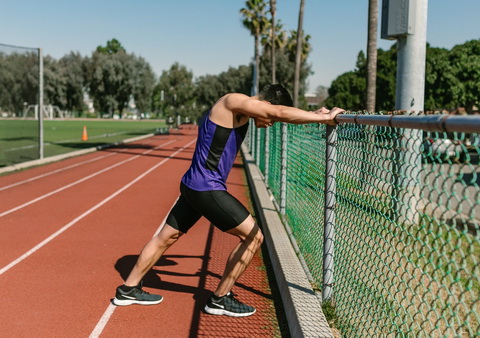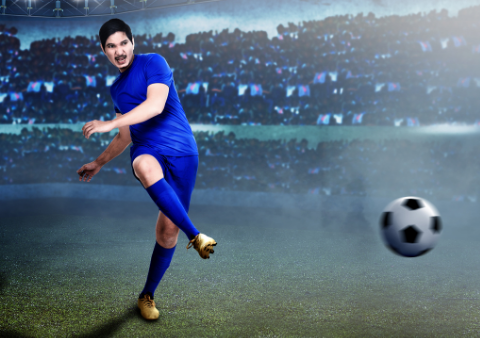Strengthening your muscles is crucial when you play football. Workouts are one way to prevent football injuries. Your triceps assist in throwing and blocking, among other fundamental movements. That is why you should keep your body strength and agility at their best, in the field or the gym. So, what are the best exercises for football players, and when should they do them?
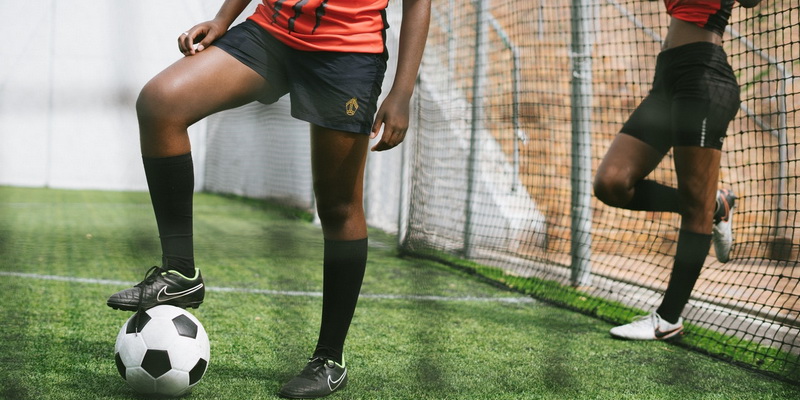
Why exercise as a football player?
Agility and strength are great qualities of a football player. However, they do not come easy and need dedication and commitment to achieve. That is where exercise comes in. Whether warming up or cooling down from your training session, your body needs to be prepared to handle the work you put in.
- Warm-up is one of the best exercises for football players enhance muscle power and improves their performance. A workout before your main game will help you boost your overall athletic performance and lift more weight.
- A cool-down exercise for football players is crucial in relieving muscle fatigue and stabilizing your breathing rate and heartbeat.
Simple warm up exercises for football players
A warm-up exercise is a series of dynamic and static movements that loosen your muscles before a game. These simple exercises get you into the groove and ease the shock on your muscles once you are in the field.
Some easy yet convenient warm-up exercises in football include:
1. Straight legs
You probably know it as ‘the touch your toes’ exercise. This exercise warms up your hamstrings and improves your flexibility.
- You start by flexing your legs. Then, put them together, straight, and bend over your waist past the point of discomfort. Hold this position for 30 seconds.
- Alternatively, you could sit and try reaching your toes with your palm. When you feel uncomfortable, stretch a little more and hold the position for 30 seconds before releasing.
2. Forward Arm Circles while skipping
That is the warm-up exercise you need to activate your shoulders, calves, and ankles.
- Stand tall and place your arms on the sides, and skip with your right foot forward. At the same time, make a full forward circle with your left arm. Next, skip with your left foot while making forward circles with your right arm.
- The backward arm circles with a skip are the opposite of what you do above. It warms up your shoulders, ankles, and tibialis muscles. Start by standing tall with your arms on the side. Skip with your right foot forward, and make a full backward circle with your left arm. Then, skip with your left foot forwards while making a full backward circle with your right arm.
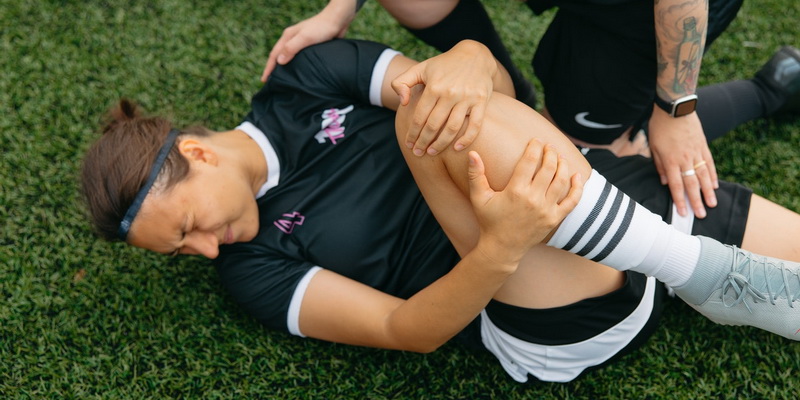
3. Reverse Quad Pulls
That is one of the best exercises for football players, as it stretches their quadriceps.
- Reach down and grab your ankle from behind. Pull it towards your butt while raising the opposite arm for balance. The stretch should be light, and you will start to feel it in your quadriceps and hip flexors.
Other simple warm-up exercises you can try as a football team include:
- Groin stretches- these open and stretches your hip area. Pull your heels closer to your groin while pushing on your knees lightly. Remember to keep your back straight.
- Pogo hops is a warm-up exercise in football that activates your toes, calves, and ankles. Lock your knees, stand on the ball of your feet, with the heels off the ground. Hop forward until you cover desired distance. You can also do the reverse pogo hops to get back to your starting position.
- Walking Lunge-Start by anchoring your lead foot on the ground and twisting your torso. That warms up your hip flexors, knees and increases your range of motion.
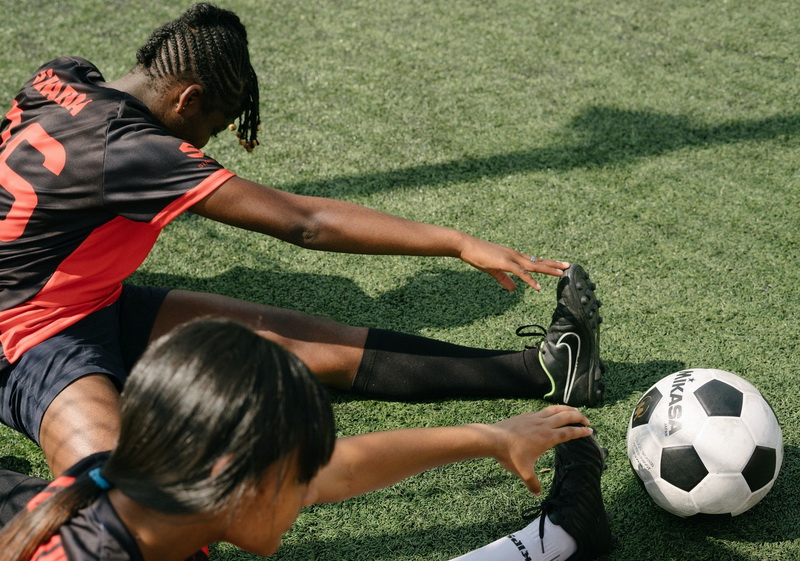
Cool down exercises for football players
Adults take about 12 to 20 breaths per minute. After the rush in the field, you are probably breathing faster than that, and you need to stabilize that. The down exercise done should be simple to avoid further fatigue on the muscles.
Always start with rhythmic breathing in and out before you proceed. Other cool-down exercises for football include:
1. Shoulder stretch
This exercise eases the fatigue on your shoulders and biceps.
- Start by folding one arm at the front, and stretch the other arm. Lock the stretched arm in the folded arm and pull the folded arm closer to your chest. Hold the stretch for 30 seconds before release, and repeat the same on the other hand.
2. Torso Stretch
- After breathing in and out to calm your breathing, stand straight in a relaxed manner, and fold your arm behind your head.
- Hold the elbow of the other arm and bend your body towards one side. Pull the elbow and stretch your entire torso and hip, and hold for 15 seconds.
3. Quadriceps stretch
- Stand firm and fold your right leg. Using your right arm, hold your leg against your butt, pull slightly, and hold the position for 10 seconds.
- Repeat the same for the left leg.
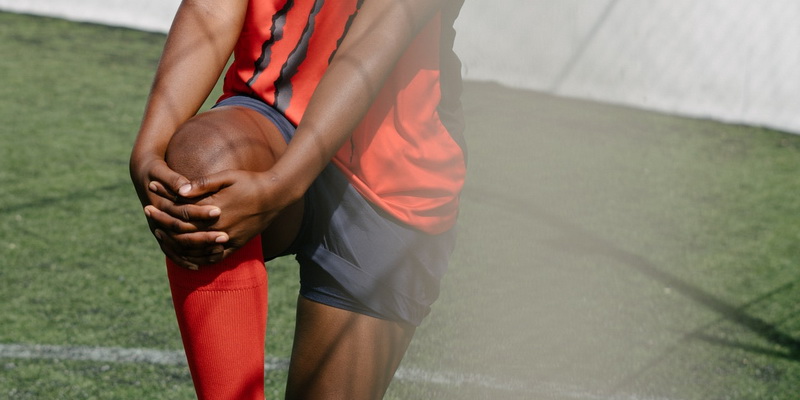
4. Hamstring stretch
To ease the fatigue on your hamstring;
- Sit on the ground
- Stretch your legs out, fold one leg, and keep the other one stretched.
- With both your arms, hold the foot of the stretched leg and bend it slightly
- Repeat the procedure on the bent foot until you feel loose and comfortable.
Exercise in football translates to the field. And since you have to run up and down the field, then you should do running drills.
Some running exercises for football include the double-stack drill
- Place six speed and agility cones in two rows, with each cone 5 yards apart.
- Start the drill by attaching leg resistance bands on your knees and move back and forth between the two rows.
- You then spring forward and perform the reverse movements until you finish the drill.
Running drills on a football field should be about power, endurance, and activating the joints. So, whenever you are out in the field preparing for a match, be careful not to strain your muscles.
Best exercises for football players – final thoughts
Exercises in football are essential. And yes, we are talking about training routines and warm-ups and cool-down activities before and after a game. ANd you can do it at home! Carrying out some of the best exercises in football recommended above improves your field performance and lowers the risk of muscle cramps while on the field. These exercises for your shoulders, neck, arms, legs, and torso also help to improve your agility, a valuable skill in the field.
